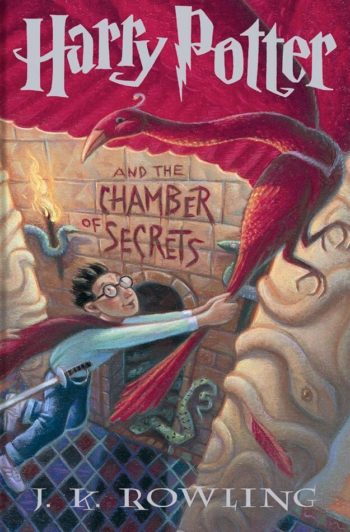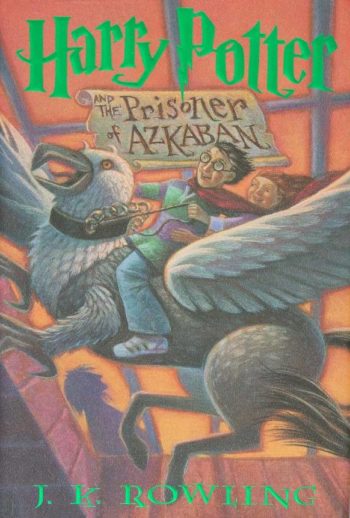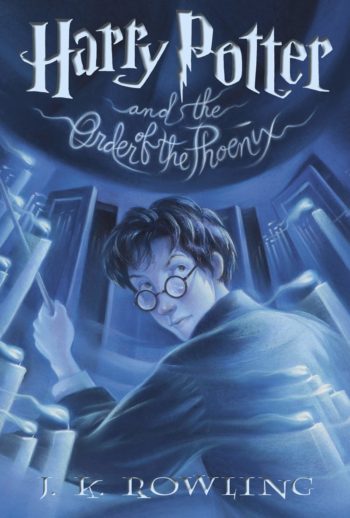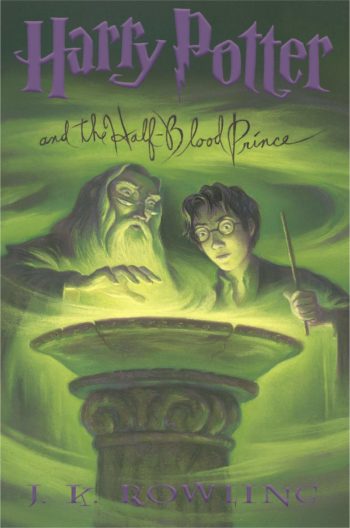As we wrap up 2018 (very slowly) here at Mildly Pleased, I figured I’d take the time to reflect on an unexpected pop culture journey that I went on over the course of last year. Which apparently involves a universe in which people just poo wherever they like…
There are often enormously popular franchises that I tend to let pass me by, which is almost certainly a product of my own snobbishness. Is this kind of apathy a good way to go through life? Well, considering people these days often make social connections over the pop culture they love, and embracing some of the more popular ones would possibly lead to a healthier social life… maybe. However, my Harry Potter fandom (or lack thereof) is a little more complicated than mere apathy.
My introduction to the Harry Potter books was my 4th grade teacher, Mrs. Gehring, who I miraculously shared with fellow Mildly Pleased contributor Sean Lemme. She read those books to us, and I, like all of the other kids in the class, was hooked. I can’t remember what exactly drew me in about those first three Harry Potter books, which I experienced and read over the course of late elementary school. But somehow that enthusiasm had faded a bit by the time the fourth book came out, which I didn’t finish. Perhaps this was because it came out during the summer, when the last thing I wanted to do was read a book (fuck school!), and because of its ungodly 700+ page length.
So for years after that, I was pretty checked out on the Harry Potter universe. More books continued to come out, as well as corresponding hit films. An entire section of Universal Studios was built to honor this franchise, and countless other young adult fantasy/sci-fi franchises arose in the series’ wake, while not quite managing to capture the unique magic contained within J.K. Rowling’s septology. The series even decided to revisit itself with the Fantastic Beasts movies, the first of which I saw for some reason, while not having read the last 3 Harry Potter books (or having seen the films). Also, it’s a testament to the modern age’s respect for spoilers that I managed to make it a decade after the final book’s publication without having any of the last three books spoiled for me.
This year, all that changed. A friend mentioned the idea of doing a Harry Potter book club – in which we read all seven of the books in the series and then talked about them. Considering I had a mild affinity (as well as a sense of incompleteness) in regards to the Harry Potter series, I figured “why not”. After all, everyone I knew who kept reading the Harry Potter books as they came out always seemed to finish them in a weekend. So how hard could reading a bunch of children’s books be?
 I can’t say that all of the Harry Potter books were walks in the park to finish, but the first in the series, Harry Potter and The Sorcerer’s Stone was a pretty breezy and delightful affair. It’s been about 11 months since I finished reading it, but the thing I remember being most struck by in that novel is Rowling’s knack for world-building, which I suppose is a must in any franchise that aims to have legs. She plants so many seeds as far as characters, mythology, the history of wizardry and its relation to the real world of muggles, that you have to admire how wide of a net Rowling cast, and how dead-set she was on following through on what had been established.
I can’t say that all of the Harry Potter books were walks in the park to finish, but the first in the series, Harry Potter and The Sorcerer’s Stone was a pretty breezy and delightful affair. It’s been about 11 months since I finished reading it, but the thing I remember being most struck by in that novel is Rowling’s knack for world-building, which I suppose is a must in any franchise that aims to have legs. She plants so many seeds as far as characters, mythology, the history of wizardry and its relation to the real world of muggles, that you have to admire how wide of a net Rowling cast, and how dead-set she was on following through on what had been established.
The first book, much like the other early books in the series, is a mystery novel in addition to being both a fantasy and coming-of-age story. Which again, gets at the wide net Rowling has cast, and the fact that the series manages to run the gamut of tones and themes, while retaining a style that is very much its own. The mystery of the first novel is clever enough, though I can’t say anything about it was revelatory on this recent reading. But I suppose the first of anything is going to be the one you remember most vividly.
 I wouldn’t say that lack of revelation is the case with the second book in the series, Harry Potter and The Chamber of Secrets. Maybe I’m just getting older and my memory is getting terrible, but the intricately woven mystery at the heart of the Chamber of Secrets genuinely took me by surprise. Somehow, I did not see the ending coming, despite the fact that I’ve read this book at least twice before. It just happened to be that the last time I read it was around 15 years ago. But I think that just speaks to the way Rowling integrates this increasingly complex universe of shapeshifting and psychic bonds into this carefully crafted contraption of a sophomore outing.
I wouldn’t say that lack of revelation is the case with the second book in the series, Harry Potter and The Chamber of Secrets. Maybe I’m just getting older and my memory is getting terrible, but the intricately woven mystery at the heart of the Chamber of Secrets genuinely took me by surprise. Somehow, I did not see the ending coming, despite the fact that I’ve read this book at least twice before. It just happened to be that the last time I read it was around 15 years ago. But I think that just speaks to the way Rowling integrates this increasingly complex universe of shapeshifting and psychic bonds into this carefully crafted contraption of a sophomore outing.
You could definitely make the case that this book relies too heavily on exposition, but then again, so does Raymond Chandler or Agatha Christie. And I would say Rowling’s working here on that same level. It’s just that she’s juggling this vast universe of fantastic beasts and teenage friendship along with these mystery elements. Due to this seamless integration of Rowling’s particular brand of whimsy, an underlying darkness, and a tightly constructed narrative, it’s probably my favorite of the series.
 Harry Potter and The Prisoner of Azkaban, the third book in the series, is a strong outing for all of the reasons the first two books are, but also contains some of the flaws that become more prevalent in the later books. For one, the mystery isn’t nearly as tidy as Chamber, seeing as the finale relies on a time travel device that feels pretty tacked on. Also, it calls into question the stakes of literally everything that happens in Harry Potter if time travel can be used to not only save the day, but also allow for Hermione to take more classes at Hogwarts because she just loves that sweet sweet knowledge.
Harry Potter and The Prisoner of Azkaban, the third book in the series, is a strong outing for all of the reasons the first two books are, but also contains some of the flaws that become more prevalent in the later books. For one, the mystery isn’t nearly as tidy as Chamber, seeing as the finale relies on a time travel device that feels pretty tacked on. Also, it calls into question the stakes of literally everything that happens in Harry Potter if time travel can be used to not only save the day, but also allow for Hermione to take more classes at Hogwarts because she just loves that sweet sweet knowledge.
What the book does do well is set the stage for the ways in which the past comes back to haunt these characters. We’re introduced to Sirius Black, the so-called murderer that we learn was friends with Harry’s father, as well as another one of James Potter’s school chums, Remus Lupin. Lupin (a closeted werewolf), along with the slave-ish house-elves, serves as just one of many examples of Rowling connecting the injustices against those who are different in the Wizard world to those who are different in the real world. It’s something that becomes more pronounced as the series goes on, and in the process gives the series a moral complexity that I think is one of the key reasons why these books resonate so deeply with people, and why you could make the argument that they deserve to be held in higher regard than just a mere millenial fad.
 Ah yes, Harry Potter and the Goblet of Fire. The book that broke me as a Potter fan when I was 11 years old. As is the case with books 4-7, this one is far longer than the first three and thus can’t help but feel a bit unfocused. That said, Goblet of Fire I’m more forgiving of for its unruliness just because there’s so much fun stuff about The Tri-Wizard Tournament – a Hunger Games-style tournament of skill and daring that this fourth installment revolves around. We get to see Harry interact with Dragons and Mermaids, which just as all these books do, make it feel like there’s an endless array of commonly known fantasy creatures inhabiting this world. And because challengers from around the world (though mostly Europe) come to compete in this tournament, we get a broader view of how the Wizarding world operates as this expansive network around the globe.
Ah yes, Harry Potter and the Goblet of Fire. The book that broke me as a Potter fan when I was 11 years old. As is the case with books 4-7, this one is far longer than the first three and thus can’t help but feel a bit unfocused. That said, Goblet of Fire I’m more forgiving of for its unruliness just because there’s so much fun stuff about The Tri-Wizard Tournament – a Hunger Games-style tournament of skill and daring that this fourth installment revolves around. We get to see Harry interact with Dragons and Mermaids, which just as all these books do, make it feel like there’s an endless array of commonly known fantasy creatures inhabiting this world. And because challengers from around the world (though mostly Europe) come to compete in this tournament, we get a broader view of how the Wizarding world operates as this expansive network around the globe.
One thing I haven’t really brought up yet is Voldemort, the wispy villain whose presence is always at the background (and occasionally the foreground) of the early books. In Goblet of Fire, Voldemort comes further to the forefront, due to this assumedly dead Dark Wizard coming back from the dead. Perhaps I hadn’t brought him up because there isn’t much to say about Voldemort. He’s just this purely evil guy. Though the series does make an effort to humanize him by constantly relaying in flashback and conversation the nature of Voldemort’s upbringing as orphan-boy Tom Riddle. Which is just one more element of the past having dire consequences on the present and future of these characters.
 I’m sure it has its defenders, but Harry Potter and the Order of the Phoenix not only is the longest book in the series (at 870 pages), but also feels about 3 times longer than any of the other books. As I hinted at, the finale of Goblet of Fire sees the reemergence of Voldemort as a living being, which raises the stakes of Harry’s personal journey considerably. And yet, somehow Order of the Phoenix seems almost entirely uninterested in exploring that. Instead of pushing our heroes into action, the book spends a cumbersome amount of time focusing on Ministry of Magic bureaucrat Dolores Umbridge, who is perhaps the most unlikeable character in the series. Which is quite a feat, considering some of the characters are straight-up murderers.
I’m sure it has its defenders, but Harry Potter and the Order of the Phoenix not only is the longest book in the series (at 870 pages), but also feels about 3 times longer than any of the other books. As I hinted at, the finale of Goblet of Fire sees the reemergence of Voldemort as a living being, which raises the stakes of Harry’s personal journey considerably. And yet, somehow Order of the Phoenix seems almost entirely uninterested in exploring that. Instead of pushing our heroes into action, the book spends a cumbersome amount of time focusing on Ministry of Magic bureaucrat Dolores Umbridge, who is perhaps the most unlikeable character in the series. Which is quite a feat, considering some of the characters are straight-up murderers.
Basically, Umbridge’s deal is that because of this new Voldemort presence, she doesn’t want anything fun or interesting (like Quidditch or Defense Against The Dark Arts) to happen at Hogwarts. Which (unsurprisingly) saps a lot of the fun and interest out of this book. In addition to that, you get the travails of Harry, Ron, and Hermione going through puberty and exploring a newfound curiosity in the opposite sex. This is all fine, I guess. I don’t think it’s the main selling point of this series, but probably does make things feel a bit more grounded in reality than a series about witches and wizards has any right to. Also, as much as this book does feel like a place holder before shit really starts to go down in books 6 and 7, it does mark the first time a major character dies, and thus effectively propels us into endgame territory.
 Compared to books 4 and 5, Harry Potter and the Half-Blood Prince, feels a bit more focused. Most of the book’s own focus is both on the past and its ramifications, and on the relationship between Harry and Hogwarts’ Headmaster, Dumbledore. It’s weird that I haven’t mentioned Dumbledore yet, but I suppose he is just kind of in the background of all the early novels, without ever having a ton of impact on the main overall stories. In Half-Blood Prince, Dumbledore spends a lot of time dippin’ his and Harry’s heads into the Pensieve, a weird cauldron-type thing that lets you see into people’s memories.
Compared to books 4 and 5, Harry Potter and the Half-Blood Prince, feels a bit more focused. Most of the book’s own focus is both on the past and its ramifications, and on the relationship between Harry and Hogwarts’ Headmaster, Dumbledore. It’s weird that I haven’t mentioned Dumbledore yet, but I suppose he is just kind of in the background of all the early novels, without ever having a ton of impact on the main overall stories. In Half-Blood Prince, Dumbledore spends a lot of time dippin’ his and Harry’s heads into the Pensieve, a weird cauldron-type thing that lets you see into people’s memories.
So as you might guess, a lot of this book sees Harry and ol’ Dum-Dum trying to unravel the mystery of Voldemort’s past, and what it might reveal about his current whereabouts. You would think this would come off as narratively stagnant and expository, but for the most part it doesn’t. This is because Harry often has to go to great lengths to retrieve the memories that will help him fulfill the prophecy laid down in the previous book that he must go head-to-head against Voldemort. The book also sees Harry spending lots of time with the series’ on-again-off-again villain Severus Snape, who provides perhaps the most shocking ending of any Harry Potter book. Oh, and also there’s a bunch of teen drama that’s not super compelling, but oh well.
 As you’ve probably noticed, I’ve tried to steer clear of spoiler territory. Possibly because I enjoyed being able to read these monumentally popular stories that hadn’t been spoiled for me, and I guess this is my way of paying it forward to the internet at large. And though I’m in the camp of people who prefer the earlier books over the later ones, I would say Harry Potter and the Deathly Hallows does a very good job of following through on every thing that had been established and set up in the previous books. It also has the added bonus of feeling a bit more fresh than the books that preceded it, since the majority of it doesn’t take place at Hogwarts. Instead, we mainly get our core trio of characters – Harry, Ron, and Hermione – hiding out in the woods as Voldemort and the Death Eaters have all but taken over Wizard society, while Harry must find the Horcruxes keeping Voldemort alive, and destroy them and (Voldemort) once and for all.
As you’ve probably noticed, I’ve tried to steer clear of spoiler territory. Possibly because I enjoyed being able to read these monumentally popular stories that hadn’t been spoiled for me, and I guess this is my way of paying it forward to the internet at large. And though I’m in the camp of people who prefer the earlier books over the later ones, I would say Harry Potter and the Deathly Hallows does a very good job of following through on every thing that had been established and set up in the previous books. It also has the added bonus of feeling a bit more fresh than the books that preceded it, since the majority of it doesn’t take place at Hogwarts. Instead, we mainly get our core trio of characters – Harry, Ron, and Hermione – hiding out in the woods as Voldemort and the Death Eaters have all but taken over Wizard society, while Harry must find the Horcruxes keeping Voldemort alive, and destroy them and (Voldemort) once and for all.
J.K. Rowling imbues a lot of these books (and their titular character) with a kind of purity and penchant for doing the right thing. The Deathly Hallows aims to tear a lot of this down. We learn both that some of the more heroic characters in the series aren’t all that heroic, and that some of the more villainous ones aren’t all that villainous. It’s a bold move, but also one that isn’t all that surprising considering the more sinister tone of the later books. It also seems like a fitting (if somewhat bleak) way to leave its readers, as I imagine the kids who first discovered these books were nearly adults by the time this seventh and final book was released, and so it deals with the more adult realities of compromise, betrayal, and death.
——————
As I stated, this is a monumentally popular series, and so I’m sure there are thousands (maybe millions) of people capable of giving a more thoughtful or informed take on this series. I probably got even a few things wrong, but I’m not going to fact-check them (sorry). Instead, I’ll just leave you by saying that overall I enjoyed reading this series, even though it is far from perfect. But what it did well, it clearly did well enough to make it a ubiquitous piece of modern youthhood. I don’t know if it’ll continue to stay in the public consciousness of young people everywhere, but considering how much I was able to get out of reading these books that I have a pretty low level of nostalgia for, I’d say it’ll be some time before these books truly disapparate from the public consciousness.
